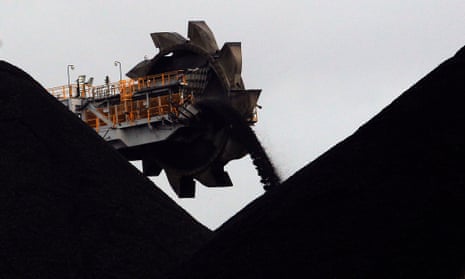ANZ has decided to stop lending money to Australia’s biggest coal port, the Port of Newcastle, after adopting new policies last year that prohibit it entering new finance deals for customers with significant exposure to the fossil fuel.
The bank, which had been part of a syndicate of lenders, decided not to participate in the refinancing of hundreds of millions of dollars owed by the port, Guardian Australia has confirmed.
However, another member of the syndicate, NAB, has agreed to fill the gap under an agreement that market sources said binds the port to a program of reducing its carbon emissions.
Financial institutions are increasingly factoring the risk of lending to fossil-fuel intensive businesses into investment decisions.
It reflects an expectation governments and the private sector will increase the pace of emissions cuts in an attempt to live up to the goals of the Paris climate agreement. Several major economies, including the US, China, the EU and Japan, have lifted their climate goals in recent months.
The port already has a program to reduce emissions from its own operations under way, and has plans to build a container terminal that would help reduce its dependence on coal exports, which make up about 95% of traffic.
However, the future of the project is uncertain because it is required to pay its competitors, the Port of Kembla and Port Botany, a fee for every container it ships above a threshold level.
The fee requirement was part of a deal struck by the NSW government in May 2013 to privatise Kembla and Botany.
It is under attack in federal court litigation launched by the Australian Competition and Consumer Commission against the buyer of Kembla and Botany, Ports NSW, which alleges the deal is anti-competitive and makes the development of a container terminal at Newcastle uneconomic.
Ports NSW, which paid $5.1bn for the two ports, has said it “will be vigorously defending the proceedings”.
ANZ’s withdrawal from the Port of Newcastle syndicate was first reported by the Australian on Tuesday. The bank declined to comment.
In October, the bank said it would halt lending to its largest customers unless the businesses could demonstrate carbon transition by this year. It said it aimed to support efforts to achieve net zero emissions by 2050, and would no longer lend to new business customers with a greater than 10% exposure to thermal coal.
The announcement enraged Nationals MPs. The agriculture minister, David Littleproud, called for a boycott of the bank and the deputy prime minister, Michael McCormack, saying the plan was “virtue signalling” that would hurt farmers.
Queensland backbencher George Christensen subsequently said he would try to launch an inquiry through the trade and investment growth committee to query how climate change was impacting banks’ lending decisions. The inquiry is yet to be confirmed, with Nationals and Liberal MPs at odds over whether it should go ahead.
Dan Gocher, from the Australasian Centre for Corporate Responsibility, said on Tuesday ANZ’s Port of Newcastle decision was about risk management, and the climate crisis posed a clear financial risk. “They’re not in the business of supporting businesses through thick and thin, they’re in the business of making money,” he said.
Emma Herd, the chief executive of the Investor Group on Climate Change, said an irreversible shift was occurring across the economy as major financial institutions priced the risk posed by climate change into their decisions.
She called on governments to work with the private sector to ensure the “inevitable transition” was managed smoothly to protect workers and diversify economies in emissions-intensive areas. “Pretending this transition is not occurring won’t help foster the new investment opportunities needed to bolster our national prosperity,” she said.
An NAB spokesperson said the bank could not comment on specific customers. “NAB is focused on being a financial partner with its customers, helping to adapt and improve the sustainability of their businesses through innovation and expertise in domestic and global markets,” she said.
“We are focused on serving customers well and helping communities to prosper – this requires a long-term sustainable approach to decision making.”
A Port of Newcastle spokesperson said it was focused on sustainability.
“We are working with responsible lenders who are interested in helping businesses like PON become more sustainable and diversify,” he said. “This is crucial to a business that supports our local, regional and national economies.”
The port is half owned by the Infrastructure Fund, which also owns airports, power and rail assets, and half owned by Hong Kong-listed conglomerate China Merchants Port Holdings Company, which owns ports around the world.
In January alone it exported 13.9m tonnes of coal. Its second biggest export was wheat, at just 238,000 tonnes.
